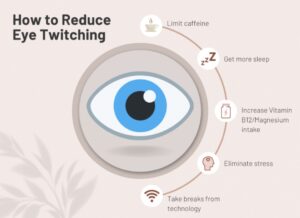
A frequent condition that may run in families is eye twitching.
Although the precise reason for eye twitching is unknown, the condition may start in the brain’s motor nerves.
An episode may be triggered by dry eyes, stress, exhaustion, ocular strain, or certain drugs.
In most cases, eye twitching is brief and goes away on its own. More persistent conditions may require medication and, sometimes, surgery.
Why do your eyes twitch?
Eye twitching falls into one of two types and is a common, occasionally hereditary condition:
Eyelid myokymia: The majority of individuals with this minor form of sporadic eye twitching do not need therapy.
The benign essential form of blepharospasm involves prolonged, involuntary contractions that cause the eyelids to partially or completely close. Patients who suffer from benign essential blepharospasm may experience severe functional impairment and need long-term care.
Why do your eyes twitch?
Although the specific cause of eye twitching is unknown, a number of circumstances, such as the following might cause or make it worse:
discomfort eye strain
a few treatments and substances, including caffeine
inflamed or dry eyes
inadequate slumber
Symptoms of Eye Twitching
Eye twitching produces twitching or uncontrollable blinking by affecting the muscles in the eyelid. A minor eyelid twitch may appear more evident than it is.
The eyelids may close tightly for a few seconds, minutes, or even hours when the twitching is more severe. The symptoms could get worse before they get better.
Identification of Eye Twitching
If eye twitching occurs frequently, you should see a doctor to rule out other eye problems including blepharitis (inflamed eyelids) or nervous system conditions such:
“Bell’s palsy”
dystonia and Tourette’s syndrome are a few sclerosis. Getting Rid of Twitching In minor circumstances, your eyes’ twitching self-limits or disappears on its own. There are certain steps you can do to hasten the process.
Take more naps.
Reduce your alcohol and/or caffeine intake.
Try stress-relieving exercises, deep breathing exercises, or meditation.
Use artificial tears to cure dry eyes.
treatment for twitching eyes
Consult your eye doctor to identify the best course of action if your eye twitching persists for several weeks or causes you to have trouble opening your eye or seeing. Your doctor might suggest drugs or a course of action for botulinum toxin injections. The skin around the eyes is injected with botulinum toxin. Every round of injections prevents spasms for roughly three months because the toxin relaxes and weakens the muscles that are just beneath the skin. Minor bruising at the injection sites, momentary eyelid drooping, or transient double vision are possible side effects of these injections.
Rarely, in extreme situations, if symptoms are not properly managed by the botulinum toxin injections, surgery may be advised.
